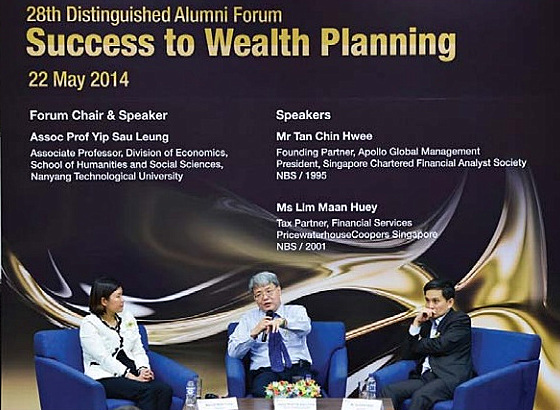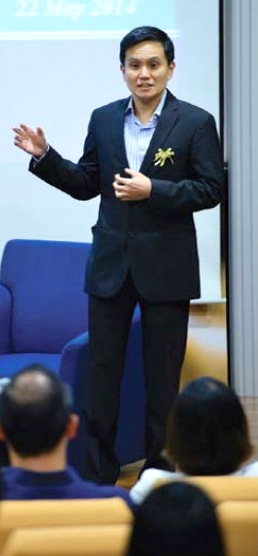This article first appeared in the June 2014 issue of the NTULink magazine, published by the Alumni Affairs Office, Nanyang Technological University, and is reproduced with permission.
PARTICIPANTS ATTENDING the 28th Distinguished Alumni Forum on 22 May heard from expert speakers who shared valuable information and provided some tips on investment. Titled ‘Success to Wealth Planning’, the forum session at NTU’s one-north campus was attended by close to 160 participants.
Starting the session was alumnus Mr Tan Chin Hwee (NBS/1995), the Founding Partner of Apollo Global Management. He highlighted the importance of assessing one’s risk appetite and spending needs in order to make a sound decision on investment. It is critical to take into consideration the need, the ability, and the willingness to take risks which will decide on one’s asset allocation and portfolio construction.
Mr Tan, who is also the President of the Singapore Chartered Financial Analyst Society, shared more about the different asset allocation models – David Swensen’s Asset Allocation and Optimal Asset Allocation (Merton).
 L-R: Ms Lim Maan Huey (NBS/2001), Assoc Prof Yip Sau Leung, and Mr Tan Chin Hwee (NBS/1995). Photo: NTU
L-R: Ms Lim Maan Huey (NBS/2001), Assoc Prof Yip Sau Leung, and Mr Tan Chin Hwee (NBS/1995). Photo: NTU
Tax Partner, Financial Services at PricewaterhouseCoopers (PwC) Singapore, Ms Lim Maan Huey (NBS/2001), spoke about why taxation matters in wealth planning and the tax implications when investing. As different countries implement varied tax rates, this would affect one’s decision on where to stay and where to invest. It would be important to understand the foreign tax implications when investing overseas. Ms Lim also went on to explain the different taxes such as income tax and capital gains tax. The final speaker for the session, Forum Chairperson Associate Professor Yip Sau Leung from NTU’s School of Humanities and Social Sciences (HSS), Division of Economics, gave an overview of important concepts and recommendations for asset investments. He provided information on the different avenues of investment available, such as property and shares.
Prof Yip highlighted the advantages of investing in property for one’s future although the property market may be volatile at times. For example, as long as one does not purchase property at its peak, its price will continue to rise.
This is due to inflation, GDP growth and innovation, and urbanisation. He also explained the different property market trends in Singapore, Hong Kong, Malaysia, Taiwan and India. The forum session was then opened to the floor for the question and answer
session with members of the audience participating actively. It was an informative evening as the participants gained much knowledge on how one is able to manage one’s wealth and finances successfully for a comfortable future.
 Mr Tan Chin Hwee explains that successful investors draw lessons from their previous Participants ask the forum speakers questions on how best to manage one’s wealth. failures, hence becoming better investors.
Mr Tan Chin Hwee explains that successful investors draw lessons from their previous Participants ask the forum speakers questions on how best to manage one’s wealth. failures, hence becoming better investors.Following the forum session, Mr Tan Chin Hwee shares more of his views with NTULink.
There have been a number of financial crisis over the past few years. Why do you think these happen and what can an individual do to better prepare himself/herself should it happen again?
Financial crisis are necessary evils and unavoidable in the capitalistic system as the market is effectively driven by greed and fear - what Keynes terms as “animal spirits”. Pre-crisis, the sustained market bull-run builds investor confidence which eventually results in irrational exuberance and the under-pricing of risk; crises happen when an event triggers the adjustment of risk-pricing, a large adjustment sends markets into panic. Historically, markets always overshoot at major turning points at the top (greed) and at the bottom (fear).
To avoid the pain of financial crisis, as an investor, you have to understand what is your risk profile; this is a critical success factor for investors. Key is to be independent and contrarian in your investment decisions, a word of advice from Warren Buffett - “Be Fearful When Others Are Greedy and Greedy When Others Are Fearful”. You have to be able to bet. But you also have to have enough fear to have the caution.
Do you think someone who is risk averse can be trained to become a risk taker? Why or why no?
Q: Which scenario hurts more to you? Do you feel more pain when you lose money on an investment? or does it hurt more when you missed an opportunity to invest in something that subsequently rises in value.
Scenario 1: Feeling more pain when you lose money on an investment.
Scenario 2: Feeling more pain when you miss out on an investment opportunity
This phenomenon in Scenario 1 is a consequence of loss aversion. Loss aversion is a cognitive bias that affects most investors. The theory states that people value gains and losses differently. Extensive research in behavioural economics has shown that people experience twice as much pain when they face a loss in comparison to the pleasure they feel with a gain of the same magnitude.
As a result of this cognitive bias, loss aversion causes investors to hang on to loss-making positions longer than they should in order to avoid realising their losses. They also cash in on profitable positions too soon because the pain of losing their profits exceeds the pleasure they get from seeing additional gains.
On the flipside, people who experience more pain in Scenario 2 are less affected by loss aversion. They derive more pleasure from gains than they experience pain when faced with a loss of the similar magnitude. People who exhibit this trait have the potential to become successful fund managers because they are able to cut losing positions faster than the typical investor. They are also less hasty in cashing out on winning positions because the pleasure of seeing a +1% gain outweighs the pain of a -1% loss. Therefore, this immunity to loss aversion allows an investor to generate excess returns over time.
One can be trained to up to a certain level. The younger the person, the better the chance for change in behavior to be more permanent. At the end of the day, there seems to be an inherent risk parameter in each person that is difficult to materially change. Key here for the mentor is not to mould the person into your own image/risk profile but to appreciate the risk profile of the mentee and adapt and adjust so as to maximize a long term sustainable trade off.
|
Why do you think some people are very successful investors whilst there are others who fail? Can one do something to protect oneself from failure?
 Successful investors are able to draw lessons from their previous failures or the failures of others, hence they become better investors over a shorter space of time. Successful investors are able to draw lessons from their previous failures or the failures of others, hence they become better investors over a shorter space of time.
Eliminating risk would eliminate returns -- this is not possible in real life; key is to price the risk appropriately - a successful investor produces higher risk-adjusted returns, but has to risk failure nonetheless, depending on his risk appetite.
Many top successful investors effectively engage in decision making involving an intuitive assessment of situations. This process is often hard for many to accept but is likely a genuine component of successful investing. This intuition comes from experience, and experience comes from bad judgement in the past!
|
These days, many people in Singapore feel that they are unable to retire early due to rising costs. How do you think a person can better prepare himself for retirement whilst gainfully employed, though wealth management techniques.
For the past 20 years, the STI has generated an average return of 5% per year (vs average CPI inflation of 1.7% pa over the same period), this means that a dollar invested 10 years ago would have accumulated to $2.66 today. Hence it would be advisable to start investing early and bank on the compounding effect. Practice diversification through asset allocation, choose asset classes whose returns exhibit low correlation to optimise your portfolio by lowering overall risk.
What would you say to someone who is preparing to invest for the first time? What should he/she look out for?
Invest only the amount you can afford to lose. Gamble and speculation are not investing; they are not the same at all. To succeed one must respect “risk”. If investing in managed funds or investment schemes, look out for the management fees involved and evaluate performance on a post-fees basis. Just like all other professions, there are no short cuts in understanding investing basics and hard work is needed, especially in a field that has attracted the best and the brightest.
Previous story: TAN CHIN HWEE: Insights from climb to the top of the financial industry  L-R: Ms Lim Maan Huey (NBS/2001), Assoc Prof Yip Sau Leung, and Mr Tan Chin Hwee (NBS/1995). Photo: NTU
L-R: Ms Lim Maan Huey (NBS/2001), Assoc Prof Yip Sau Leung, and Mr Tan Chin Hwee (NBS/1995). Photo: NTU  Mr Tan Chin Hwee explains that successful investors draw lessons from their previous Participants ask the forum speakers questions on how best to manage one’s wealth. failures, hence becoming better investors.Following the forum session, Mr Tan Chin Hwee shares more of his views with NTULink.
Mr Tan Chin Hwee explains that successful investors draw lessons from their previous Participants ask the forum speakers questions on how best to manage one’s wealth. failures, hence becoming better investors.Following the forum session, Mr Tan Chin Hwee shares more of his views with NTULink.






